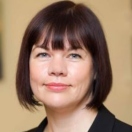Caroline Rees QC, 30 Park Place Chambers, Cardiff
 Caroline Rees QC becomes the second of only two female criminallaw silks in Wales following her success in the 2017 QC competition.She was one of 32 women (from the total of 119) appointed silkfollowing the QC ceremony in Westminster Hall in February 2018.
Caroline Rees QC becomes the second of only two female criminallaw silks in Wales following her success in the 2017 QC competition.She was one of 32 women (from the total of 119) appointed silkfollowing the QC ceremony in Westminster Hall in February 2018.
Caroline had had no previous connections with the legal professionwhen the deputy headmaster of her Welsh language comprehensiveschool in Llanelli encouraged her to attend court with his barristerson. That experience fired Caroline’s interest in pursuing a career in advocacy. She tookher law degree at Birmingham University and then attended Bar school in London. Whilst atuniversity, Caroline worked in a Job Centre where she said she acquired some highlyvaluable skills that set her in good stead in her career. In particular, Caroline said that shelearned to be comfortable in ‘hearing her own voice’ and how to deal and communicate witha wide range of people, some of whom were vulnerable.
In 1994, Caroline began her pupillage at 33 Park Place, Cardiff. She moved to 30 Park Placein 1999 where she has remained ever since. Initially, she worked primarily on personalinjury cases, with some criminal work, but it was the latter that she was particularlyinterested in as she developed a wider practice. She particularly enjoyed the courtroomadvocacy. She went on to develop her current particular specialism in cases entailingserious sexual offending including allegations of historical sexual abuse. Caroline was alsoinstructed on high-profile cases including ones on people trafficking for purposes of sexualexploitation, and on homicide and drugs conspiracies arising from large scale policeoperations.
These days, when talking to young people who aspire to a career in advocacy (and inparticular in criminal law), Caroline encourages them to look beyond seeking mini-pupillages(as valuable as these are) to also gaining a much broader experience of the world of workand, particularly in dealing with a broad range of people in society. In addition, Carolineencourages young people to read good literature and watch good films, plays etc., in orderto expose themselves to ideas and language that will assist them in developing greatcommunication skills, which are essential at the Bar. She personally believes that seniormembers of the profession like her have a social mobility responsibility to go into schoolsand talk with pupils. This enables young people to see that most barristers are not anythinglike the aloof, upper middle class stereotype they might see on their screens attired instrange wigs and gowns, and that people like Caroline come from similarly ‘ordinary’backgrounds as themselves. In other words, if they have the necessary ability andwillingness to work extremely hard, they too can aspire to the senior levels of the legalprofession.
There was no single spur to Caroline applying for QC when she did. It was more a case ofhaving been an incredibly busy senior-junior for a number of years, an increasing number ofher peers and judges whom she greatly respected were suggesting to her that she shouldthink seriously about applying for silk. Caroline still had to overcome a residual reluctance toapply arising from the notion that “Queen’s Counsel was not something for people like me”.She had been concerned that the profile of her cases due to the nature of her specialism –which were before Circuit judges rather than High Court judges – would count against her.However, having been appointed a Recorder in 2016 had brought Caroline in to greatercontact with female silks, which was encouraging. There were few women QCs in Walesand she began to feel it was incumbent upon her to do something about that, by making anapplication.
Caroline knew that her cases were ones of substance as defined in the QC appointmentsprocess, and having looked carefully at what she had done in terms of the scheme’scompetencies, she realised that she could make a credible application. She wouldencourage other would-be applicants in her specialism not to be put off if they did not havemurder cases, as historical sex cases could be just as weighty in terms of their importance,complexity and substance.
Caroline was also encouraged by the ‘profiles’ on previous successful applicants with moreunusual backgrounds, and in particular one on her fellow criminal barristers, Mary Prior QC,in Leicester. Mary’s story inspired Caroline not simply in terms of her practice profile butalso in terms of coming from a modest background, and was also fired up by herprofessional ethos and enthusiasm in being a role model for others.
Having decided to make her application for silk, Caroline had to trawl through her cases withthe competency framework and the guidance for applicants close to hand in order to identifythose cases and potential assessors that seemed most likely to be the source of thenecessary evidence of excellence. There was a great deal of detail to get to grips with in theframework and guidance, but all the necessary information was there. It was important notto under-estimate the importance of your work and cases, which was possible as these werewhat you dealt with day-in and day-out. You had to be prepared to step out from yourcomfort zone and advocate for yourself for once, and this was an unusual, even alienexperience.
Caroline would recommend future applicants to have a rather longer preparatory build up totheir application than she gave herself, in terms of checking what they were doing in theircases against the competencies as they went along, over a period of a couple of yearsleading up to an application. She believed that it was very important to complete theapplication form yourself even if you did seek outside help, although having a trustedcolleague, perhaps a newly appointed QC, to look over the completed form was a good idea.Finally, having a really well completed application form provided a solid foundation if youwere called to interview.
Caroline said she really enjoyed the interview. She felt that the members of the SelectionPanel who interviewed her had ‘really done their homework’ on her and her cases, and were‘genuinely interested in me.’ The interviewers struck just the right note, asking very testingquestions within a friendly interview. They provided her with ‘the best opportunity to showmy best’. Caroline particularly enjoyed the exchanges on diversity. It was, in her view, vitalto ‘be yourself’ at the interview and be ‘honest about yourself on the application form.’ Shesensed that the interviewers would be extremely adept at sniffing out any false notes orcoached answers.
Caroline said that after 20 years working as a junior including in more recent years as asenior junior with a “punishing workload”, she felt that becoming a QC was almost like afresh start, and “incredibly exciting”. She hoped that the QC ‘badge’ would enable her towiden the scope of her practice, perhaps to include more homicide cases. She also hopedthat being a silk would enable her to carve out a better work/ life balance. She referred tothe domestic side of her life as the “usual managed chaos” of a very busy working mum(Caroline is married with two school-aged children). She added, “we shall see!”
Caroline and her family greatly enjoyed the QC ceremony. She said it was “brilliant” and“much less austere” than she had imagined. The icing on the cake for her was the letter ofcongratulations that she received from her old school Deputy Headteacher (now in his mid80s) who had been instrumental in setting her on the path of her highly successful legalcareer.
- Date: March 19, 2019
- Category: QCA Profiles 2018


